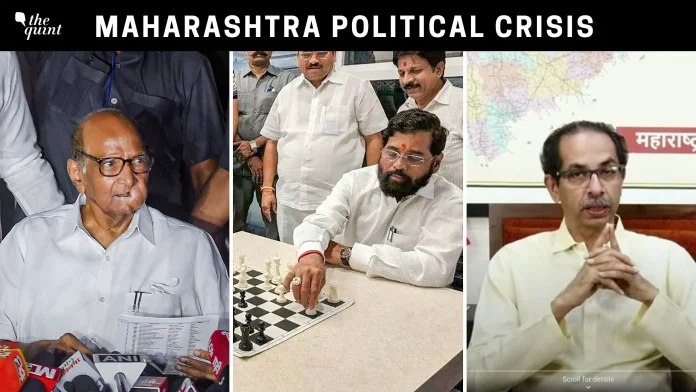The ongoing political crisis in India’s richest state, Maharashtra, is showing no signs of ending soon as rebel lawmakers jostle to take control of the governing party.
Around 40 lawmakers from the Shiv Sena, which governs the state in a coalition with two other parties, have reportedly said they have lost trust in Chief Minister Uddhav Thackeray. The lawmakers are trying to take control of the party and bring down the government.
Mr Thackeray, in turn, has sought to disqualify the rebel lawmakers from the Maharashtra state assembly.
On Monday, India’s Supreme Court will hear Eknath Shinde’s – a senior state minister who is leading the rebellion- petition challenging attempts to disqualify him and other lawmakers.
The rebellion has put the state government’s fate in jeopardy.
The rebel lawmakers are currently holed up in a hotel in Guwahati city in the northeastern state of Assam, thousands of kilometres away from their home state. This means that the governing coalition is at risk of losing its numerical majority in the state assembly.
Correspondents say that the state is effectively without a government at the moment as several ministers are in Guwahati and others are working to tackle the crisis.
An ongoing battle
The Shiv Sena is led by Uddhav Thackeray. He is the son of the party’s founder Bal Thackeray, a charismatic politician whose critics say he used divisive politics to draw loyalty from Marathi-speaking people in Maharashtra, especially in the capital city of Mumbai.
Mr Shinde and the rebels claim that the Shiv Sena’s strident right-wing Hindu legacy has been diluted by its alliance with the centrist the Nationalist Congress Party (NCP) and the Congress.
They say they won’t quit the Shiv Sena – instead, they have sought to claim Bal Thackeray’s legacy, calling themselves Shiv Sena-Balasaheb. Mr Thackeray’s team has written to India’s Election Commission to thwart these attempts.
Mr Thackeray is also trying to draw the rebels – which include nine state ministers – back into his fold through a combination of negotiations and whip-cracking.
Over the weekend, Narhari Zirwal, the deputy speaker of Maharashtra’s assembly – who belongs to the NCP – gave a disqualification notice to Mr Shinde and 15 other lawmakers and asked them to reply within 48 hours. The 16 lawmakers have, in turn, served a no-confidence motion against Mr Zirwal and asked him not to act against them until the Supreme Court hears their petition.
Their petition say the disqualification notice was “illegal and unconstitutional”.
The two sides have also been taking potshots at each other on social media and while speaking to reporters.
Reports say Mr Thackeray’s loyalists have been protesting across the state. The federal government has increased the security cover for some of the rebel lawmakers.
Why the rebellion matters
Maharashtra is one of India’s largest states and politically crucial for all national parties – it is home to India’s financial capital Mumbai, film industry Bollywood and some of the country’s largest industries.
Developments in the state often have a direct impact on national politics.
Since 2019, Maharashtra has been governed by an unusual coalition of parties with opposing ideologies – the right-wing Shiv Sena, the centrist NCP and the Congress, along with independent lawmakers.
Together, they managed to cobble together enough numbers to cross the halfway mark of 144 lawmakers in the 288-member assembly, thwarting India’s governing Bharatiya Janata Party (BJP), which had won the largest number of seats.
The alliance took shape after the Shiv Sena split with the BJP, its long-time partner, following differences over power sharing. Despite sharing a similar ideology, the two Hindu nationalist parties had an uneasy relationship in the years leading up to the split.
After the erosion of the Shiv Sena’s original vote bank of Marathi-speaking people, it positioned itself as a party which represented Hindu interests, and its base has been traditionally anti-Congress.
So its alliance with the Congress had raised eyebrows and elicited predictions of political doom. But Mr Thackeray and his allies had managed to weather several crises – until now.
Reports say that Mr Shinde is interested in reviving the alliance with BJP, bringing it back to power in the state.
Senior Shiv Sena leaders have also blamed the BJP for the revolt, accusing it of trying to topple the coalition government.
But senior BJP leaders have denied this, saying the crisis was Shiv Sena’s “internal matter”.
How did it start?
The crisis began after Mr Shinde became “unreachable” after legislative council elections in the state last week.
READ ALSO: 15 Palestinian children killed by Israeli regime so far in 2022 – Report
The Shiv Sena and its allies were predicted to win six of the 10 seats, but they got only five. The BJP, which was expected to win only four, won the other five, amid reports of cross-voting by Sena rebels.
Mr Shinde, accompanied by 11 other Sena lawmakers, had left for Surat city in the western state of Gujarat – where a BJP government is in power.
Hours later, they flew to Guwahati city in Assam, which is also ruled by the BJP. The Indian Express newspaper quoted unnamed sources who said that the group was moved to Assam partly because Gujarat was “too close to Maharashtra” – raising the risks of disgruntled lawmakers returning to Mr Thackeray.
To avoid disqualification under India’s anti-defection law, Mr Shinde needs the support of 37 lawmakers in the state. He has claimed the support of 40 Sena lawmakers and six independents, but the number is yet to be independently verified.













